

Www.uiowa.edu/~c036088/meyer.pdf. The Myth of Objectivity in Journalism. By This page has been accessed since 29 May 1996.
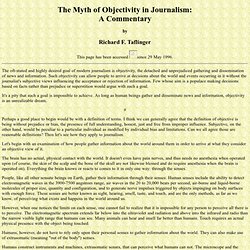
The oft-stated and highly desired goal of modern journalism is objectivity, the detached and unprejudiced gathering and dissemination of news and information. Such objectivity can allow people to arrive at decisions about the world and events occurring in it without the journalist's subjective views influencing the acceptance or rejection of information. Few whose aim is a populace making decisions based on facts rather than prejudice or superstition would argue with such a goal.
It's a pity that such a goal is impossible to achieve. Perhaps a good place to begin would be with a definition of terms. Let's begin with an examination of how people gather information about the world around them in order to arrive at what they consider an objective view of it. The brain has no actual, physical contact with the world. People, like all other sensate beings on Earth, gather their information through their senses. The answer is no. Objectivity, Professionalism, and Truth Seeking in Journalism : C.W. Anderson.
Journalism, Objectivity, Objectivity in News Reporting, Fox News, MSNBC. Is objectvity dead?
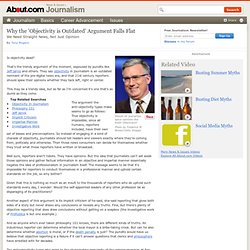
That's the trendy argument of the moment, espoused by pundits like Jeff Jarvis and others. They say objectivity in journalism is an outdated remnant of the pre-digital news era, and that 21st century reporters should spew their opinions whether they tack left, right or center. This may be a trendy idea, but as far as I'm concerned it's one that's as dumb as they come. The argument the anti-objectivity types make seems to go as follows: True objectivity is impossible, since all humans, reporters included, have their own set of biases and preconceptions.
”Objectivity in journalism is an illusion” Public Journalism and the Problem of Objectivity.htm. Media bias. Media bias is the bias or perceived bias of journalists and news producers within the mass media in the selection of events and stories that are reported and how they are covered.
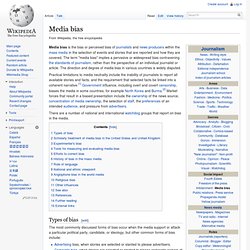
The term "media bias" implies a pervasive or widespread bias contravening the standards of journalism, rather than the perspective of an individual journalist or article. 7 Principles of Media Objectivity. Media manipulation is one of the most unfortunate aspects of the Israeli-Palestinian conflict.
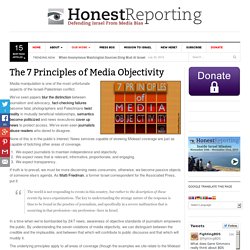
We’ve seen papers blur the distinction between journalism and advocacy, fact-checking failures become fatal, photographers and Palestinians twist reality in mutually beneficial relationships, semantics become politicized and news executives cover up news to protect access. We’ve even seen journalists abuse readers who dared to disagree. None of this is in the public’s interest. The need for media objectivity in reporting conflict. The media, both print and electronic, can play an important role in defusing tension, reducing and containing conflicts.
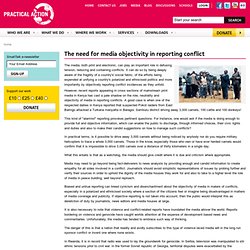
It can do so by being deeply aware of the fragility of a country's' social fabric, of the efforts being expended at unifying a country's polarized and ethnicised politics and more importantly by objectively reporting conflict incidences as they unfold. However, recent reports appearing in cross sections of mainstream print media in Kenya has cast a pale shadow on the role, neutrality and objectivity of media in reporting conflicts. A good case is when one of the respected dailies in Kenya reported that suspected Pokot raiders from East Baringo attacked a Turkana manyatta in Baragoi, Samburu district driving away 3,000 camels, 100 cattle and 100 donkeys! This kind of "alarmist" reporting provokes pertinent questions.
What this entails is that as a watchdog, the media should give credit where it is due and criticism where appropriate. no comments. The importance of objectivity in the media. Objectivity in Journalism: A Search and a Reassessment. Objectivity (journalism) Journalistic objectivity is a significant principle of journalistic professionalism.
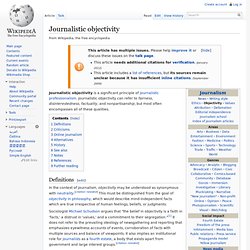
Journalistic objectivity can refer to fairness, disinterestedness, factuality, and nonpartisanship, but most often encompasses all of these qualities. Definitions[edit] Sociologist Michael Schudson argues that "the belief in objectivity is a faith in 'facts,' a distrust in 'values,' and a commitment to their segregation. "[1] It does not refer to the prevailing ideology of newsgathering and reporting that emphasizes eyewitness accounts of events, corroboration of facts with multiple sources and balance of viewpoints. Criticisms[edit] Advocacy journalists and civic journalists criticize the understanding of objectivity as neutrality or nonpartisanship, arguing that it does a disservice to the public because it fails to attempt to find truth. What is objectivity in journalism? Objectivity is expressing or dealing with facts or conditions as perceived without distortion by personal feelings, prejudices or interpretations.
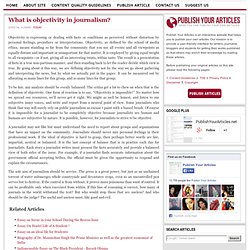
Objectivity, as defined by the school of media ethics, means standing so far from the community that you see all events and all viewpoints as equally distant and important or unimportant for that matter. It is employed by giving equal weight to all viewpoints—or if not, giving all an interesting twists, within taste. The result is a presentation of facts in a true non-partisan manner, and then standing back to let the reader decide which view is true. By going about it this way, we are defining objectivity not by the way we go about gathering and interpreting the news, but by what we actually put in the paper. It can be measured out by allocating so many lines for this group, and so many lines for that group. To be fair, any analysis should be evenly balanced.
The sole aim of journalism should be service.